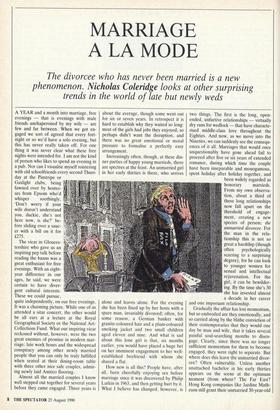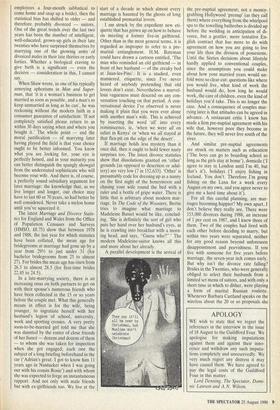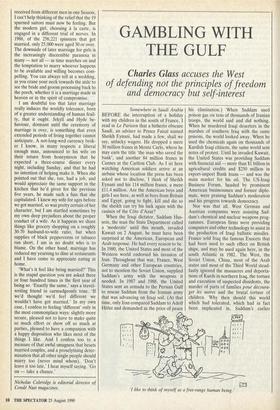MARRIAGE A LA MODE
The divorcee who has never been married is a new trends in the world of late but newly weds
A YEAR and a month into marriage, free evenings — that is evenings with male
friends unchaperoned by my wife — are few and far between. When we got en- gaged we sort of agreed that every fort- night or so we'd have a solo evening, but this has never really taken off. For one thing it was never clear what these free nights were intended for. I am not the kind of person who likes to spend an evening in a pub. Nor can I visualise myself roistering with old schoolfriends every second Thurs- day at the Pinstripe or Gaslight clubs, being fawned over by hostes- ses from Epsom who'd whisper soothingly, 'Don't worry if your wife doesn't understand you, duckie, she's not here now, is she?' be- fore sliding over a sauc- er with a bill on it for £275.
The vicar in Glouces- tershire who gave us an inspiring pep talk before reading the banns was a great enthusiast for free evenings. With an eight- year difference in our ages, he said, we were certain to have diver- gent cultural interests. These we could pursue, quite independently, on our free evenings. It was a charming picture. While one of us attended a sitar concert, the other would be all ears at a lecture at the Royal Geographical Society or the National Art- Collections Fund. What our inspiring vicar reckoned without, however, were the two great enemies of promise in modern mar- riage: late work hours and the widespread conspiracy among other newly married people that you can only be truly fulfilled when seated at their dining-room table with three other nice safe couples, admir- ing newly laid Amtico flooring.
Almost all the married couples I know well stepped out together for several years before they came engaged. Three years is about the average, though some went out for six or seven years. In retrospect it is hard to establish why they waited so long: most of the girls had jobs they enjoyed, so perhaps didn't want the disruption, and there was no great emotional or moral pressure to formalise a perfectly easy arrangement.
Increasingly often, though, at these din- ner parties of happy young marrieds, there are spectres at the feast. An unmarried girl in her early thirties is there, who arrives alone and leaves alone. For the evening she has been fixed up by her hosts with a spare man, invariably divorced; often, for some reason, a German banker with granite-coloured hair and a plum-coloured smoking jacket and two small children aged eleven and nine. And what is sad about this lone girl is that, six months earlier, you would have placed a huge bet on her imminent engagement to her well- established boyfriend with whom she shared a flat.
How new is all this? People have, after all, been cheerfully enjoying sex before marriage since it was discovered by Philip Larkin in 1963, and then getting hurt by it. What I believe has changed, however, is two things. The first is the long, open- ended, unfurtive relationships — virtually dry runs for wedlock — that have characte- rised middle-class love throughout the Eighties. And now, as we move into the Nineties, we can suddenly see the consequ- ences of it all. Marriages that would once unquestionably have gone ahead fail to proceed after five or six years of extended romance, during which time the couple have been inseparable and monogamous, spent holiday after holiday together, and been widely regarded as
honorary marrieds. From my own observa- tion, about a third of these long relationships now fall apart on the threshold of engage- ment, creating a new species of person: the unmarried divorcee. For the man in the rela- tionship this is not so great a hardship (though often psychologically scarring to a surprising degree), for he can look to younger women for sexual and intellectual rejuvenation. For the girl, it can be bewilder- ing. By the time she's 30 she has invested almost
Gradually the affair has lost momentum, but so embroiled are they emotionally, and so carried along by the blithe conviction of their contemporaries that they would one day be man and wife, that it takes several painful soul-searching months to disen- gage. Clearly, since there was no longer sufficient momentum for them to become engaged, they were right to separate. But where does this leave the unmarried divor- cee? Often vulnerable. Unless another unattached bachelor in his early thirties appears on the scene at the optimum moment (from where? The Far East? Hong Kong companies like Jardine Math- eson still grant their unmarried 30-year-old
employees a four-month sabbatical to come home and snap up a bride), then the statistical bias has shifted to older — and therefore probably divorced — suitors. One of the great trends over the last two years has been the number of intelligent, well-educated, grown-up girls in their late twenties who have surprised themselves by marrying one of the growing army of divorced males in their late thirties or early forties. Whether a biological craving to give birth is a significant — even the decisive — consideration in this, I cannot say.
When Shaw wrote, in one of his typically annoying aphorisms in Man and Super- man, that 'it is a woman's business to get married as soon as possible, and a man's to keep unmarried as long as he can', he was reckoning without the modern faith in a consumer guarantee of satisfaction: `If not completely satisfied please return to us within 30 days saying when and where you bought it.' The whole point — and the moral justification — of marrying later having played the field is that your choice ought to be better informed. You know what you are looking for, your eye is perfectly honed, and in your maturity you can better distinguish the spangly showgirl from the understated sophisticate who will become your wife. And there is, of course, a perfectly sound subsidiary argument for later marriage: the knowledge that, as we live longer and longer, our choice may have to last 60 or 70 years, so had better be well considered. Never take a melon home until you've squeezed it.
The latest Marriage and Divorce Statis- tics for England and Wales from the Office of Population Censuses and Surveys (HMSO, £8.75) show that between 1978 and 1988, the last year for which statistics have been collated, the mean age for bridegrooms at marriage had gone up by a year from 291/2 to just under 31 (for bachelor bridegrooms from 25 to almost 27). For brides the mean age has risen from 26.5 to almost 28.5 (for first-time brides 22.85 to 24.5).
In a late-marrying society, there is an increasing onus on both partners to get on with their spouse's numerous friends who have been collected in the 15 or so years before the couple met. What this generally means in effect is for the wife, being younger, to ingratiate herself with her husband's legion of school, university,
work and sporting cronies. A very pretty soon-to-be-married girl told me that she
was daunted by the roster of close friends
of her fiancé — dozens and dozens of them — to whom she was taken for inspection
when she got engaged; each one the
subject of a long briefing beforehand in the car ('Adrian's great. I got to know him 11
years ago in Nantucket when I was going out with his cousin Rosie') and with whom she was expected to forge an instantaneous rapport. And not only with male friends but with ex-girlfriends too. We live at the start of a decade in which almost every marriage is haunted by the ghosts of long established premarital lovers.
I am struck by the expedient new eti- quette that has grown up on how to behave on meeting a former live-in girlfriend. Other than in the most general terms, it is regarded as improper to refer to a pre- marital entanglement. H.M. Bateman could have drawn a cartoon entitled, 'The man who reminded an old girlfriend — in front of her husband — of the creaky bed at Juan-les-Pins'. It is a studied, even mannered, etiquette, since I've never heard of anybody pretending that old lovers don't exist. Nevertheless a marvel- lous vagueness must descend on any con- versation touching on that period. A con- versational device I've observed is never making it plain that you were ever alone
with another man's wife. This is achieved by inserting the word `all' into every reminiscence, ie, `when we were all on safari in Kenya' or 'when we all stayed at that flea-pit on the edge of the desert'.
If marriage holds less mystery than it once did, then it ought to hold fewer nasty surprises too. The latest divorce statistics show that dissolutions granted on 'other' grounds (as opposed to desertion or adul- tery) are very low (7 in 152,633). 'Other' is presumably code for dressing up as a nanny on the first night of the honeymoon and chasing your wife round the bed with a ruler and a bottle of gripe water. There is little that is arbitrary about modern mar- riage. In The Code of the Woosters, Bertie tries to imagine what marriage to Madeleine Basset would be like, conclud- ing, 'She is definitely the sort of girl who puts her hand over her husband's eyes, as he is crawling into breakfast with a morn- ing head, and says, "Guess who?" ' The modern Madeleine-suitor knows all this and more about her already.
A parallel development is the arrival of the pre-nuptial agreement; not a money- grabbing Hollywood 'prenup' (as they call them) where everything from the whirlpool spa to the towelling bathrobes is divided up before the wedding in anticipation of di- vorce, but a gentler, more tentative En- glish contract that has more to do with agreement on how you are going to live your life than the division of possesions. Until the Sixties decisions about lifestyle hardly applied to conventional couples, since the assumptions you could make about how your married years would un- fold were so clear-cut: questions like where you would live, what kind of work the husband would do, how long he would work, the care of children, even the kind of holidays you'd take. This is no longer the case. And a consequence of couples mar- rying later is that attitudes can be agreed in advance. A restaurant critic I know has made a firm pre-nuptial agreement with his wife that, however poor they become in the future, they will never live south of the river.
And similar pre-nuptial agreements are struck on matters such as education ('The boys can go to boarding school so long as the girls stay at home'), domicile ('I agree to stay in London until I'm 40, but that's it'), holidays ('I enjoy fishing in Iceland. You don't. Therefore I'm going fishing on the Laxa for a week every August on my own, and you agree never to give me a hard time about it').
For all this careful planning, are mar- riages becoming happier? My own apart, I don't believe they really are. There were 153,000 divorces during 1988, an increase of 1 per cent on 1987, and I knew three of them. Two of the couples had lived with each other before deciding to marry, but within two years were separated, neither for any good reason beyond unforeseen disappointment and peevishness. If you live with someone for five years before marriage, the seven-year itch comes early.
But why isn't the divorce rate falling? Brides in the Twenties, who were generally
obliged to select their husbands from a
limited set menu of suitors, and with only a short time in which to dither, were playing a form of marital Russian roulette. Whenever Barbara Cartland speaks on the wireless about the 20 or so proposals she received from different men in one Season, I can't help thinking of the relief that the 19 spurned suitors must now be feeling. But the modern girl, choosing a la carte, is engaged in a different trial of nerves. In 1988, of the 256,221 spinsters that got married, only 25,000 were aged 30 or over. The downside of later marriage for girls is the increasingly discernible paranoia in many — not all — as time marches on and the temptation to marry whoever happens to be available and willing becomes com- pelling. You can always tell at a wedding, as you crane your neck towards the aisle to see the bride and groom processing back to the porch, whether it is a marriage made in heaven or in the spirit of compromise.
I am doubtful too that later marriage really induces the worldly tolerance, born of a greater understanding of human frail- ty, that it ought. Jekyll and Hyde be- haviour, dormant until the ceremony of marriage is over, is something that even extended periods of living together cannot anticipate. A not-long-wed currency brok- er I know, in many respects a liberal enough man, announced to his wife on their return from honeymoon that he expected a three-course dinner every night, including Sunday, and that he had no intention of helping make it. When she pointed out that she, too, had a job, and would appreciate the same support in the kitchen that he'd given for the previous five years, he made such a fuss that she capitulated. I knew my wife for ages before we got married, so was pretty certain of her character, but I am startled sometimes by my own deep prejudices about the proper conduct of a wife. As it happens we share things like grocery shopping on a roughly 30-70 husband-to-wife ratio, but when supplies of black peppercorns or tabasco run short, I am in no doubt who is to blame. On the other hand, marriage has reduced my yearning to dine at restaurants and I have come to appreciate eating at home.
'What's it feel like being married?' This is the stupid question you are asked three or four hundred times in the first year of being so. 'Exactly the same,' says a travel- writing friend in curmudgeonly tone. 'If we'd thought we'd feel different we wouldn't have got married.' In my own case, I confess to feeling 'different' only in the most commonplace ways: slightly more secure, pleased not to have to make quite so much effort or show off so much at parties, pleased to have a companion with a happy disposition who likes most of the things I like. And I confess too to a measure of that awful smugness that besets married couples, and a proselytising deter- mination that all other single people should marry too (never mind whom). 'Don't leave it too late,' I hear myself saying. 'Go on — take a chance.'
Nicholas Coleridge is editorial director of Conde Nast magazines.












































 Previous page
Previous page